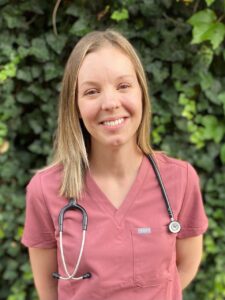The General Surgery department at Friendship Hospital for Animals offers a wide range of surgical procedures, both on an elective and emergency basis Monday through Friday.
Ovariectomy is the surgical removal of the ovaries in females and orchiectomy is the surgical removal of the testes in males, these procedures are commonly called referred to as spaying or neutering respectively.
When scheduling a spay or neuter for your pet the process begins with a pre-surgery consultation. During this appointment your pet will receive a thorough examination and you will be able to speak with the doctor about any questions or concerns. The procedure will be discussed in detail including any additional elective procedures that may be recommended. Common procedures performed at the time of spay or neuter include gastropexy, a procedure in large or ‘deep chested’ patients who may be at risk for gastric dilatation and volvulus (GDV), airway surgery in brachycephalic patients and dental extractions in pets with retained deciduous teeth.
Medication may be prescribed to help improve your pet’s comfort on the day of surgery. Typically, a combination of analgesia, anti-anxiety and anti-nausea medication is given at home prior to surgery. Pre-surgical bloodwork is required for all patients prior to surgery and can be performed during this visit.
The evening before surgery most patients should not eat after 10pm. Water does not need to be restricted. Any medication can be administered in a very small amount of food. You should plan to arrive at the hospital between 7.30 and 8.30am the morning of surgery. We recommend allowing 30 minutes to complete the necessary paperwork and consent forms for your pet.
General surgery performs procedures throughout the day with support from the anesthesia department. You should expect a call before 4pm with an update.
Patients discharged the same day are usually able to go home by 6pm. Common procedures requiring an overnight stay include spay, gastropexy and airway surgery. If your pet stays overnight discharge is after 10am the following day. Post-operative care is supported by full-time, board-certified emergency and critical care specialists.
A recovery cone collar is provided for all patients to prevent interference with the surgical incision and we recommend your pet wears this for 10-14 days post-surgery at any time you are not able to directly supervise them. Surgery suits can also be used to protect incisions.
Recovery for most elective procedures is 10-14 days. Your pet will require exercise restriction during this time, which varies depending on the procedure performed. For dogs, exercise is typically restricted to leash walks for elimination purposes. Your pet should not swim or bathe for 14 days.
Sutures for spay and neuter surgeries are typically dissolving and do not require removal. Most pets are able to return to all their normal activities after 14 days.
 Dr. Sophie Kindberg-Hanlon, BVetMed, PGCertSAS, MRCVS grew up in the British countryside surrounded by animals and always wanted to be a veterinarian. She graduated from the Royal Veterinary College of the University of London and practiced in London for several years before relocating to Washington, D.C with her husband. Dr. Kindberg-Hanlon joined Friendship’s Primary Care Department in June 2023. In addition to her clinical work she serves on the Board of Veterinary Medicine in D.C.
Dr. Sophie Kindberg-Hanlon, BVetMed, PGCertSAS, MRCVS grew up in the British countryside surrounded by animals and always wanted to be a veterinarian. She graduated from the Royal Veterinary College of the University of London and practiced in London for several years before relocating to Washington, D.C with her husband. Dr. Kindberg-Hanlon joined Friendship’s Primary Care Department in June 2023. In addition to her clinical work she serves on the Board of Veterinary Medicine in D.C.
